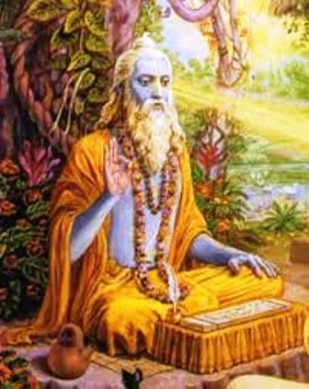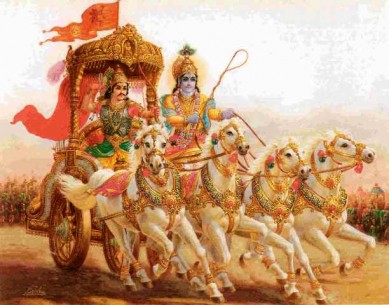It was reported a couple of years ago that the District Court at Leninskiy of Tomsk in Siberian State of the Russian Federation had been asked by Federal Security Service (FSB) to declare the third Russian edition of Bhagavad Gita By Sila Prabhupada of ISKON as an extremist literature and it should be banned. This had created a great stir in India and abroad. People belonging to Hindu religion had slammed the move of the Russians as bigotry and intolerant. Even the learned scholars all over the world were astonished at the move by the Federal Government.
Without going into the merits of the Russian allegations, I made a short study of Bhagvad Gita. More I read, more I found it would be interesting to know and understand what this Bhagvad Gita is, which is considered as one of the most sacred and popular religious scriptures of Hinduism. I understood that it is the message given by Lord Krishna to Prince Arjuna in the battle of Kurukshetra to fight his cousins who were standing face to face in the battle field. Kurukshetra is a place in the north western part of India. It is believed that it was spoken by Lord Krishna in 3137 B.C. that is, about 5000 years ago. I wrote on the teachings of Bagavad Gita. Sadly though, a lunatic, who could not understand the same, hacked the blog. I felt that what I had studied should not a go a waste and hence I retrieved whatever left of it and I am presenting it once again. Those who have read it may read it again, if they so please ( why not again?) or skip it.
The message was given in the battle field. It was a battle of good against evil. Good is represented by the Pandavas ( children of King Pandu) consisting of five brothers while evil is represented by Kauravasa, their own cousins ( children of Dhritharashta ) numbering hundred. The fight was waged by Kauravas to establish their supremacy. Pandavas were not as much endowed with riches or means while Kauravas due to their sheer wealth and land, had on their side not only a big army but all the elders including their guru/teacher. Drona was their Guru who taught them archery while Bhishma was the eldest in the family. All of them were against the Pandavas. Prince Arjuna, one of the sons of King Pandu, was endowed with knowledge of archery, but was hesitating to fight as he doubted and confused whether he could fight his own cousins and his teachers and elders. He went to the extent of getting down from the chariot and laying down his arms expressing his unwillingness to fight and kill his own relations, teachers etc. It was this doubt which Lord Sri Krishna tried to clear by explaining to him the manner in which one should conduct himself in one’s day to day life
He told Arjuna not to attach any importance to the result of one’s work, one should do his or her duty properly and steadfastly, and leave the result to itself.
In Chapter 2 verse 47, Lord Krishna tells Arjuna:
“ Karmanye Vadhikaraste, Ma phaleshou kada chana,
Ma Karma Phala Hetur Bhurmatey Sangostva Akarmaniâ€
This means :
You have the right to action only and not to fruits thereof. Do not try to be instrumental in making your actions bear fruit (which will follow according to laws of nature). Neither let your attachment be to inaction.
He gave the accurate and fundamental knowledge of God and the ultimate truth of creation, birth and death, the results of actions, eternal soul, liberation and the purpose as well the good of human existence
During the discourse, Lord Krishna revealed His identity as the Supreme Being Himself, blessing Arjuna with an awe-inspiring vision of His divine universal form.
Chapter X, Verse 20 Lord Krishna tells Arjuna:
aham atma gudakesa
sarva-bhutasaya-sthitah
aham adis ca madhyam ca
bhutanam anta eva ca
This means:
“I am the Self, Oh Gudakesa (Arjuna),
seated in the heart of all beings;
I am the beginning and the middle
and the end of all beings.”
Above verse shows how universal Lord Krishna is. He does not make any distinction between man and man, He says he is in every creature and that he is the beginning, the middle and the end. Hence there should not be any room to doubt the philosophy found in Bhagavat Gita.
The said teachings of Lord Krishna were transformed into writing by sage Vedavyasa as Bhagvad Gita. It is only an episode in Mahabharath The Mahabharath is the most voluminous book in the world. It is said that it is seven times of the size of Illiad written by Homer. Mahabharath covers the history of earth from time to time of creation in relation to India. It is composed of 100,000 rhymes quatrain couplets. It is in a story form based on four Vedas The Vedas are the oldest literatures of Indian thought, they are a collection of religious and philosophical poems and hymns composed over several generations beginning as early as 3000 BC. The Veda was composed in Sanskrit, the intellectual language of both ancient and classical Indian civilizations. Four collections were made, so it is said that there are four Vedas. The four as a group came to be viewed as sacred in Hinduism. They are called Rig, Yajur, Sama and Atharva. Mahabharath is considered as the 5th Veda as it reflects the contents of all the four Vedas.
Bhagvad Gita or in English it can be translated as Song Celestial or Song of God. Bhagvath means God and Gita means song. It is so called, though it is in prose form, as its rhyming meter is so beautifully harmonic and melodious when spoken perfectly. It is composed of 700 sanskrit verses in 18 chapters divided into three sections of 6 chapters. The sections are Karma Yoga means Yoga of action, Bhakthi Yoga means, Yoga of devotion and Jnana Yoga means Yoga of knowledge Yoga means ‘union’ between the mind, body and spirit. The teachings of Lord Krishna reveals to the mankind the means to achieve the union.
The central teaching of the Gita is the attainment of freedom or happiness from the bondage of life by doing one’s duty. It says that always remember the glory and greatness of the creator, and do your duty efficiently without being attached to or affected by the results, even if that duty may at times demand unavoidable violence

As stated above, it was written by Vedavyasa, son of Parasara and mother, Sathyavathi. His full name is Krishna Dvaipayana Vyasa. It is written in Sanskrit language, which is considered by Hindus as language of Gods. They call it as ‘Deva Bhasha’ Sanskrit means purified. India’s first Prime Minister Jawaharlal Nehru has said that Sanskrit is a language amazingly rich, efflorescent, full of luxuriant growth of all kinds, and yet precise and strictly keeping within the framework of grammar. The ancient Indians attached a great deal of importance to sound, and hence their writing, poetry or prose, had a rhythmic and musical quality.Our modern languages of India are derivatives of Sanskrit, and to it owe most of their vocabulary and their forms of expressions.
Several great philosophers, Scientists and literary geniuses such as Albert Einstien, Mahatma Gandhi, Dr. Albert Schweizer, Hermann Hesse, Ralph Walda Emerson were some of the names which can be mentioned here who have praised the Gita as a venerable scripture. “When I read the Bhagavad-Gita and reflect about how God created this universe everything else seems so superfluous to me†It was this book translated into Russian as a third edition was being sought to be banned. The jury is out and it is for you reader to decide whether there was even an iota of truth in their allegations against the song celestial or Bhagvad Gita.

